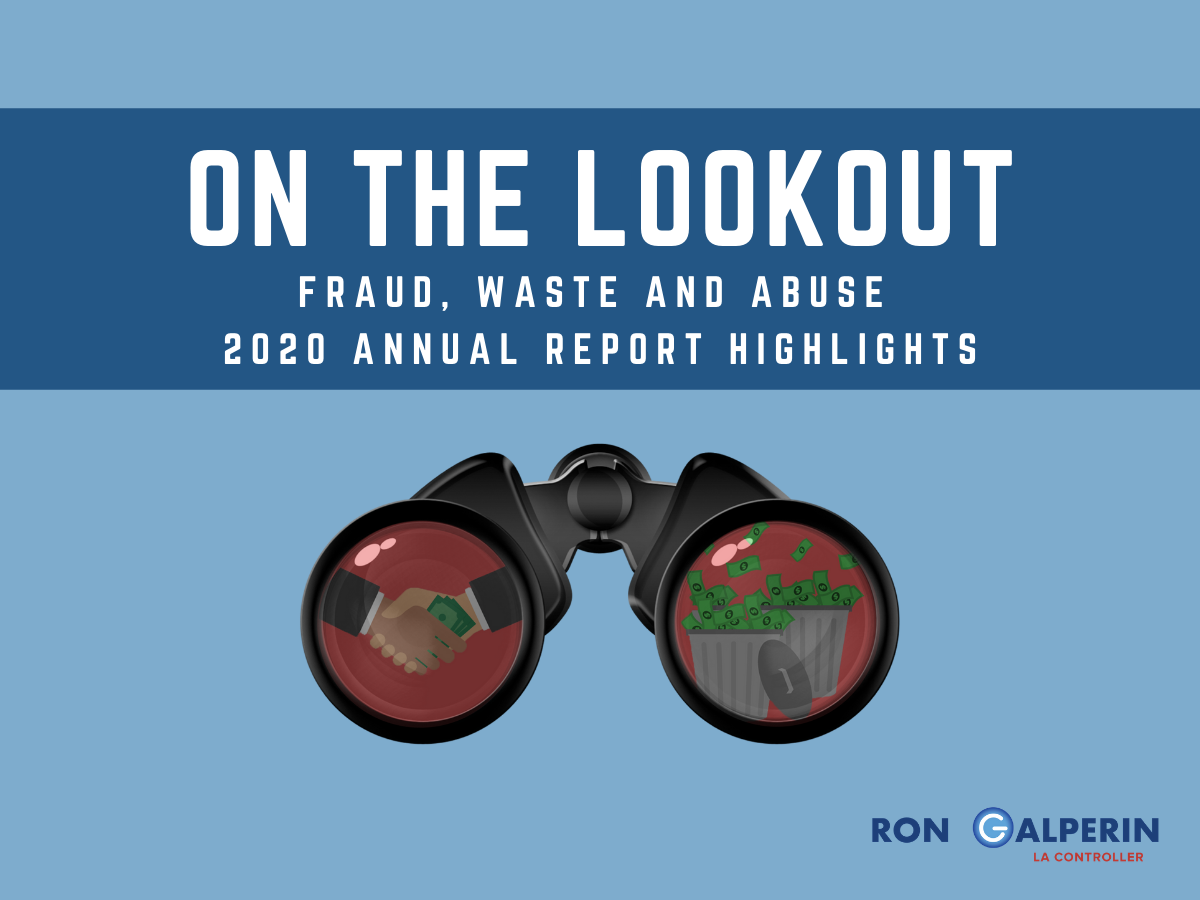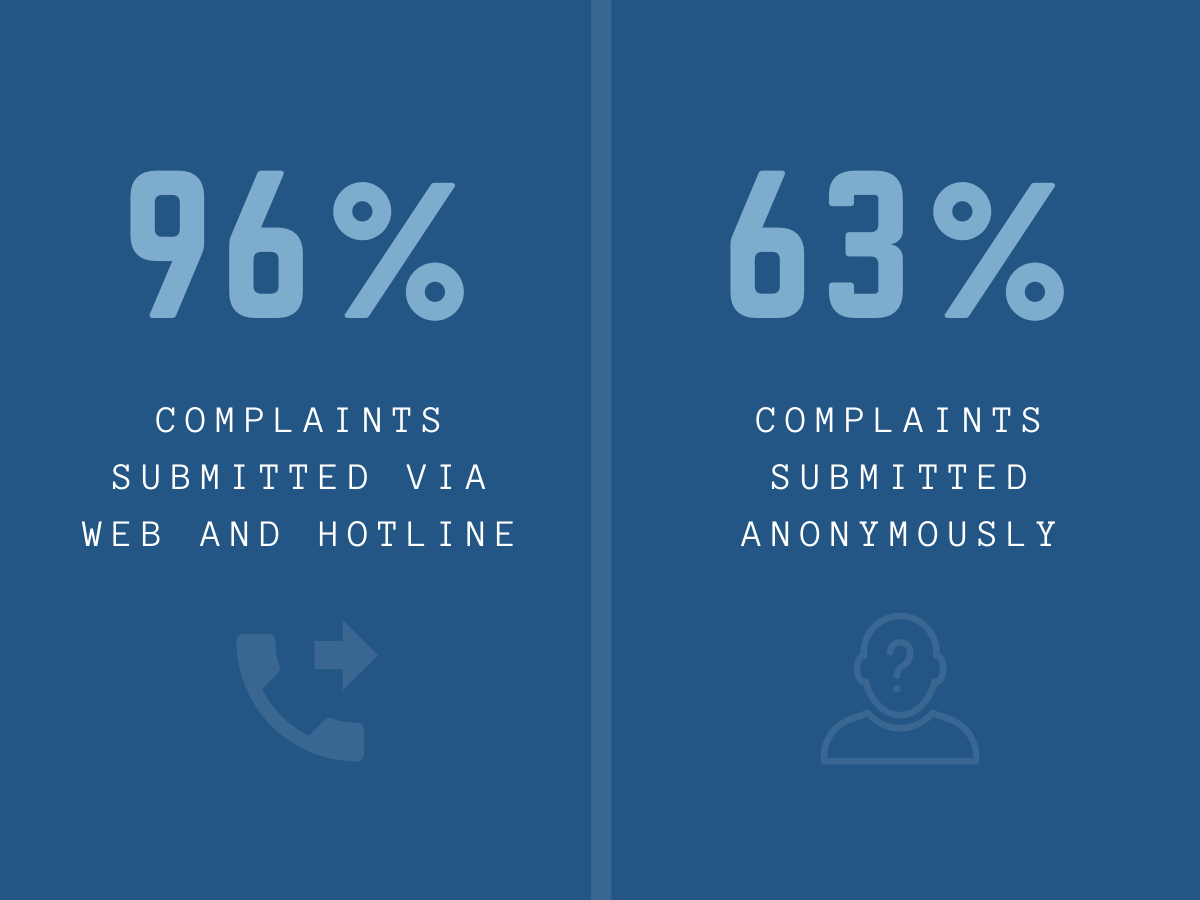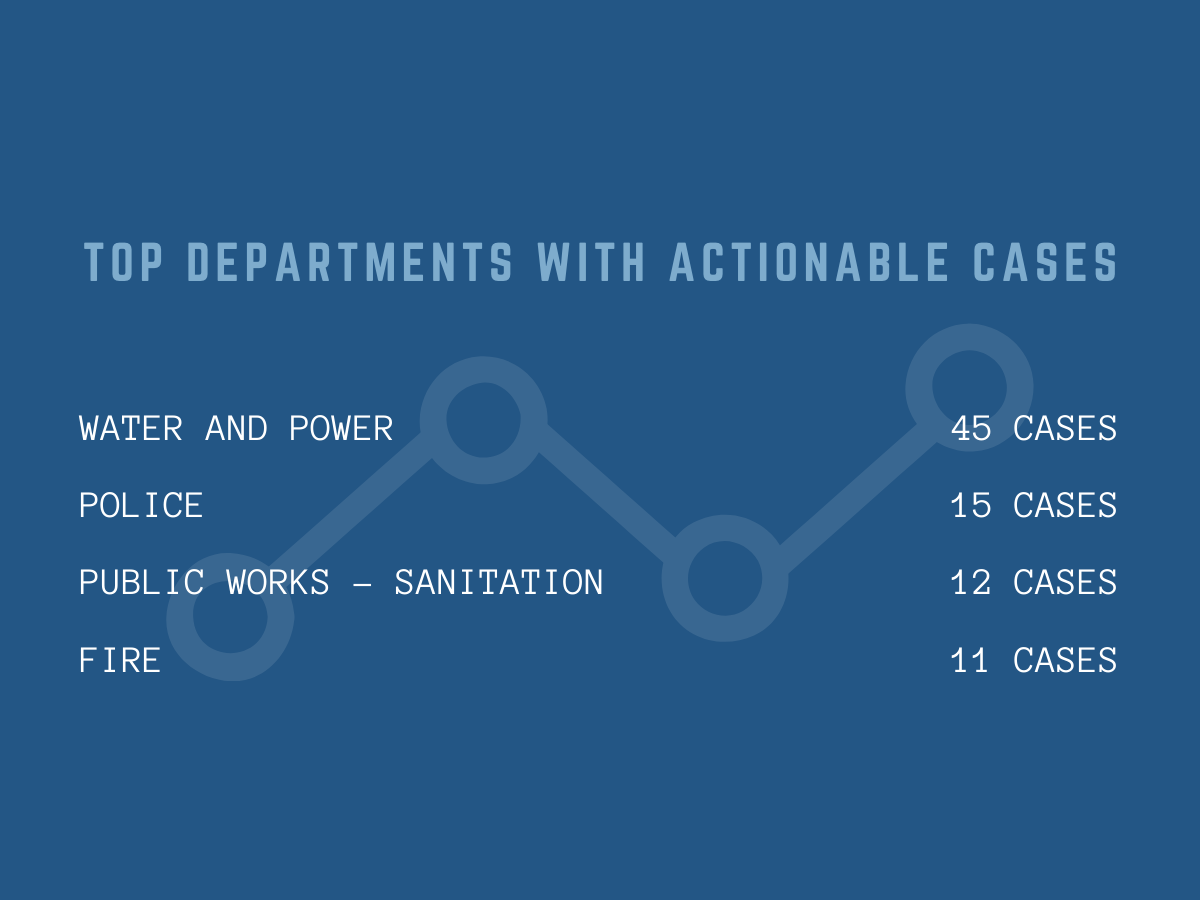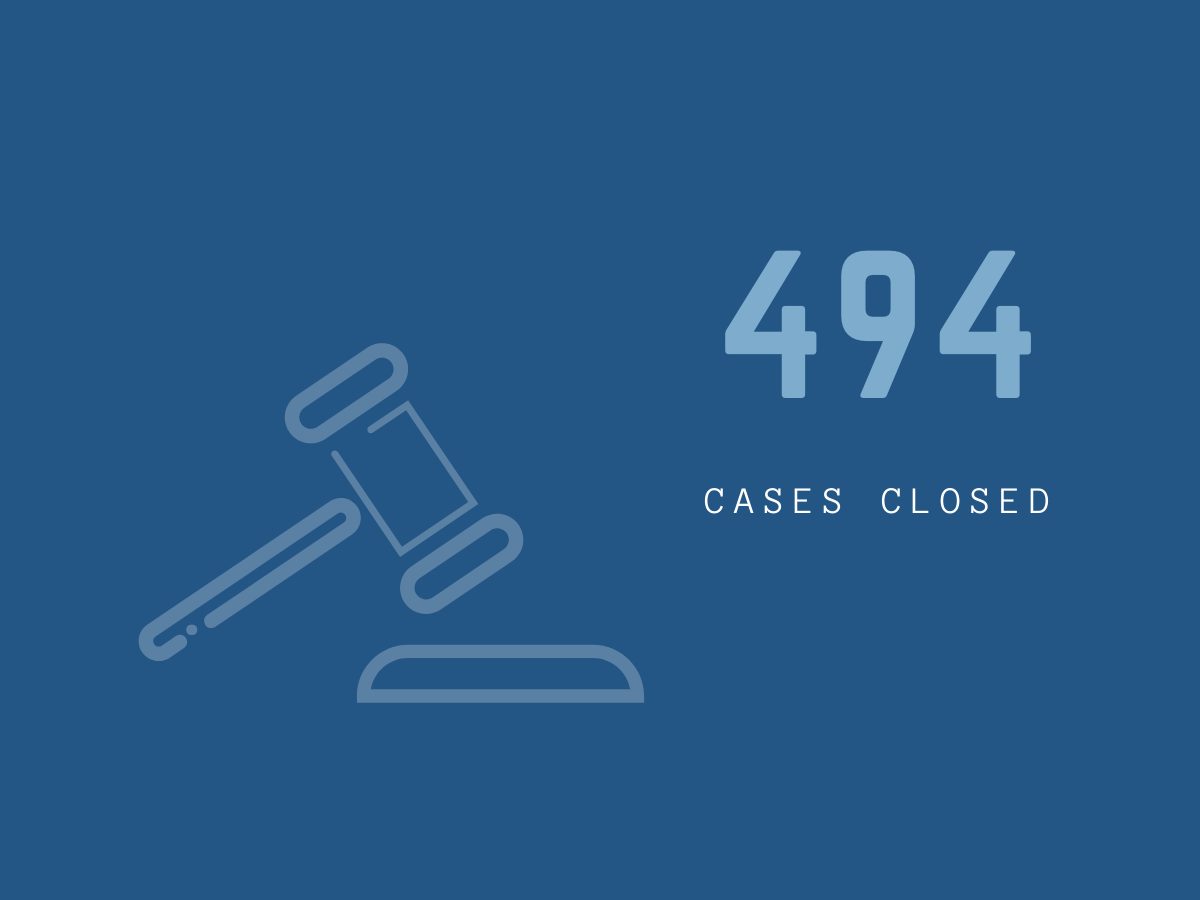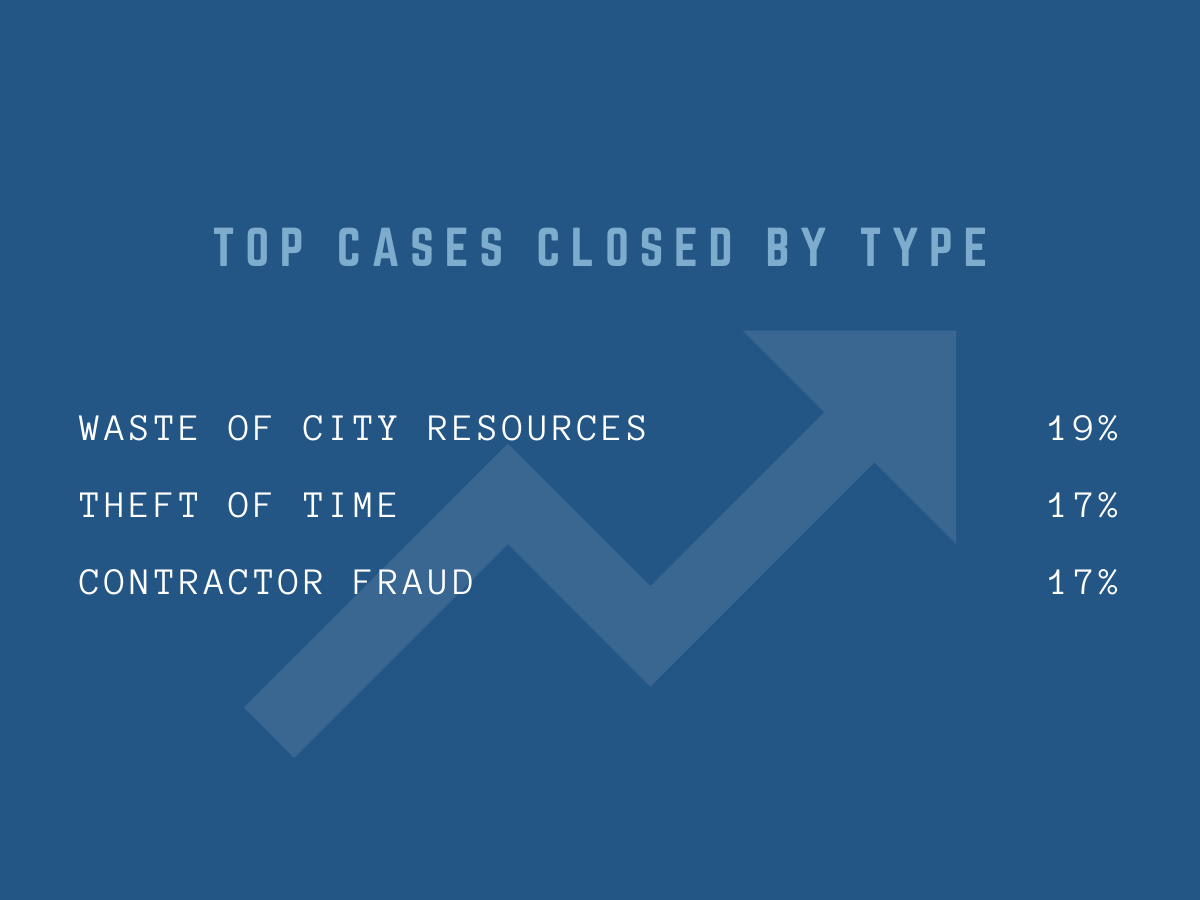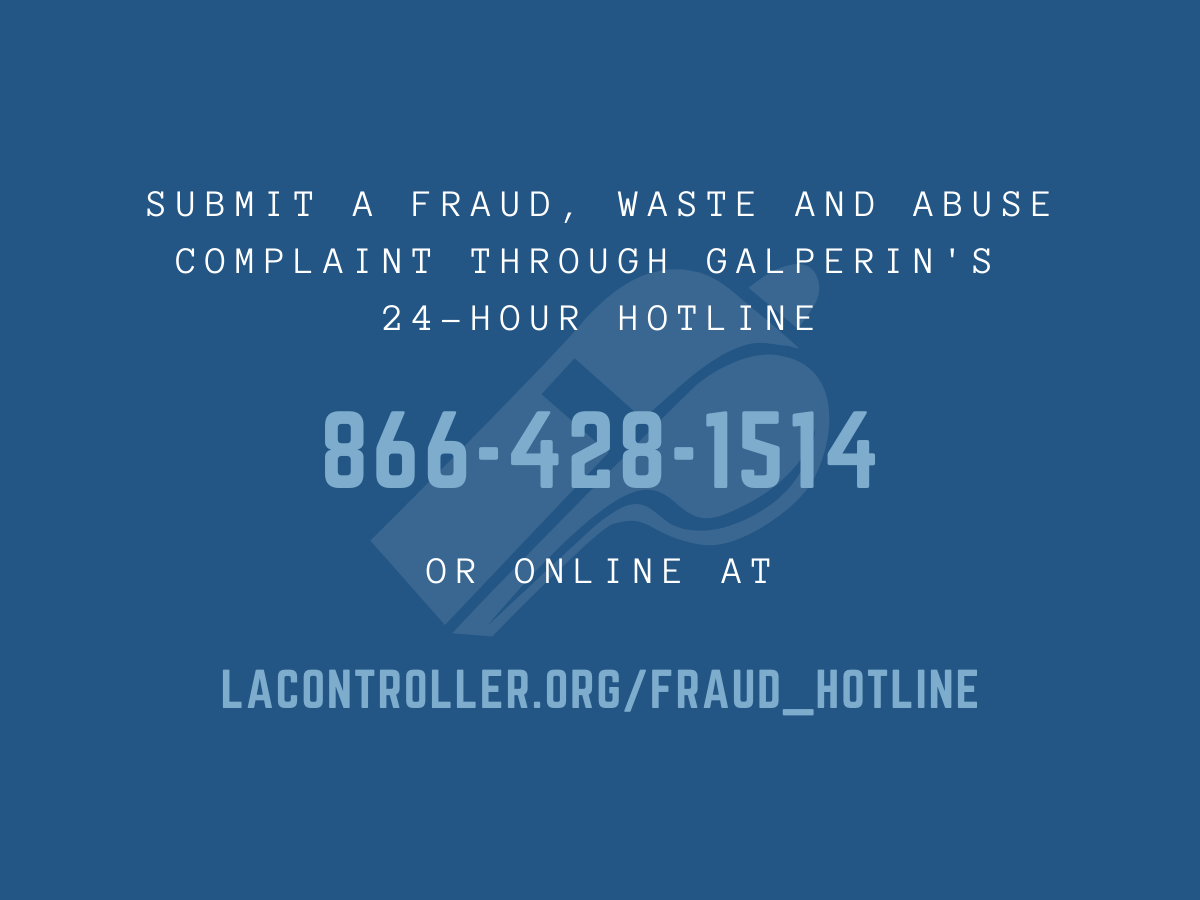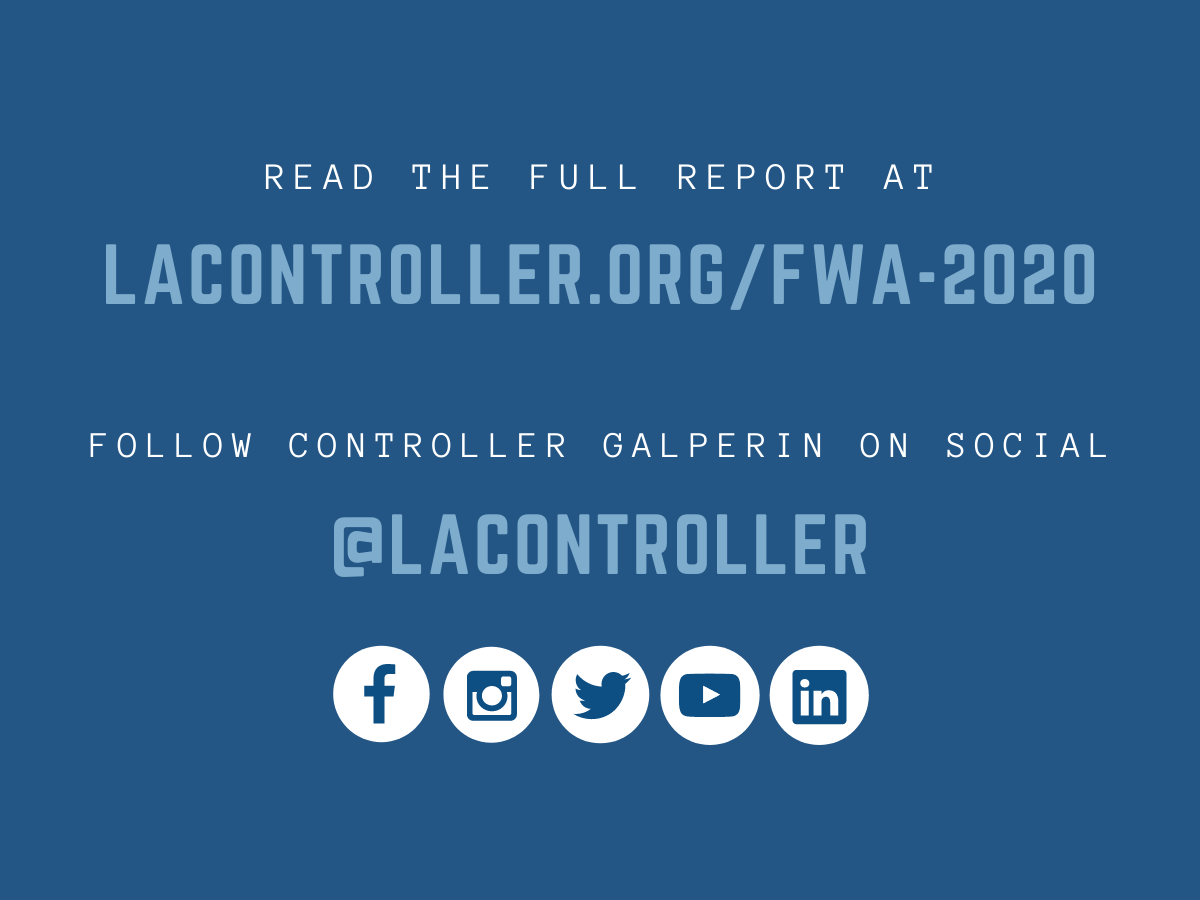On the Lookout: Fraud, Waste and Abuse 2020 Annual Report
2021 City of Los Angeles
The Controller’s Fraud, Waste and Abuse (FWA) Unit seeks to identify and prevent the misuse of City resources by employees, contractors and others. This is accomplished through a 24-hour telephone hotline and web-based complaint form, citywide education and training programs, and proactive investigations. The activity of the FWA Unit in 2020 is the subject of this report.
Each bar below contains a section of the report. Click on any to expand and read the full text of the section. Click again to collapse.
April 14, 2021
Honorable Eric Garcetti, Mayor
Honorable Michael Feuer, City Attorney
Honorable Members of the Los Angeles City Council
Re: On the Lookout: Fraud, Waste and Abuse Annual Report
The Controller’s Fraud, Waste and Abuse (FWA) Unit seeks to identify and prevent the misuse of City resources by employees, contractors and others. We do this through our 24-hour telephone hotline and web-based complaint form, citywide education and training programs, and proactive investigations. The activity of the FWA Unit in 2020 is the subject of this report.
Last calendar year, my office’s FWA Unit started with 72 ongoing cases, fielded 460 new complaints and ultimately closed 494 total cases — with 25 complaints substantiated and 111 referred to City departments for further action. The most frequent allegation was waste of City resources, accounting for 19 percent of all cases.
Examples of FWA Unit results:
- Discovered that a community-based organization funded through the Economic and Workforce Development Department overbilled the City for nearly $33,000 and lacked support for costs billed to the program. As a result of the investigation, the department is seeking to suspend the agency’s contract and recover the full grant amount disbursed ($294,000), if acceptable support documentation cannot be provided.
- Uncovered that exempt Bureau of Sanitation employees had inappropriately received overtime payments totaling $209,000 over a three-year period, resulting in repayment agreements and corrective measures.
- Found that a Bureau of Sanitation employee violated benefit regulations by covering an unqualified dependent, prompting the employee’s resignation and repayment of nearly $63,000 of City-paid health and dental benefits.
- Established that the Los Angeles Fire Department had an inefficient permitting process that resulted in numerous pending permits, long customer wait times and hundreds of thousands of dollars of lost City revenue.
Earlier this year, an updated version of the fraud, waste and abuse online training was deployed to City departments, which should have been completed by all employees by April 1. This tool has proven extremely effective in educating employees about what constitutes prohibited behavior and what to do if they witness it.
As stewards of the public’s trust, we have a shared responsibility to hold City departments and employees to the highest standards of service. My office will continue to do everything possible with the limited resources available to reduce fraud, waste and abuse of our vital public resources.
Respectfully submitted,

RON GALPERIN
L.A. Controller
The Office of the City Controller’s Fraud, Waste and Abuse (FWA) Unit was established to screen, monitor, and investigate allegations of FWA involving City resources. To support the integrity of City operations, the Unit receives, analyzes, investigates, and reports on allegations of FWA that impact City resources.
During 2020, the FWA Unit received 460 cases, a decrease of 15% from the 543 cases received in the prior year. The all-time high number of cases received during 2019 was attributed to an enhanced Fraud Awareness Training developed by the FWA Unit, which is part of the City’s required bi-annual training curriculum.
The FWA Unit has created a refreshed version of the Fraud Awareness Training which was deployed to all Departments citywide in January 2021. This training is a key resource for employees to help them remain knowledgeable about fraud risks and understand how to identify potential fraud, waste and abuse in their work setting.
The City’s definition of Fraud, Waste and Abuse is as follows:

The following highlights note the key outcomes from several substantiated cases for reviews and investigations that were conducted by, or in collaboration with, the FWA Unit during 2020:
Grant Funded Agency Concerns
- A Community Based Organization funded through EWDD was alleged to have over-recovered its costs. Our investigation substantiated that the agency billed and received reimbursement from both the City and another entity for a program employee, over-recovering nearly $33,000. In addition, the agency lacked support for allocating its costs to the City-funded program, which had also been noted by EWDD fiscal monitors. EWDD is pursuing suspension of the agency’s contract, and recovery of the full grant amount disbursed ($294,000) if the agency cannot provide acceptable support.
- A hotline tip alleged that a City contractor falsified the time records that were used to support requests for reimbursements under a City program contract. The FWA Unit investigation found that the contractor did not list the correct work hours and pay rates on the reimbursement requests, as the contractor was trying to ensure its staff received their full pay as salaried employees. The report recommended that the City Department overseeing the program provide training to the contractor regarding their billing expectations and ensure no overpayments occurred.
Employee Misuse of City Resources
- Two separate reports were made to the FWA hotline alleging misuse of parking access cards. In one case, a Bureau of Street Services employee was found to be inappropriately using a City parking keycard that belonged to another employee to circumvent the City’s parking waitlist. The second case involved a City employee allowing a non-employee to use their parking placard. In both cases, the employees received disciplinary action for violation of the City’s parking card usage policy.
- A Zoo employee was found to have misused a City vehicle by using it to drive to lunch with coworkers. The employee received disciplinary action. The City has a strict policy on the appropriate use of City vehicles.
Payroll Overpayments and Benefits Fund
- A hotline tip alleged that multiple Sanitation employees had inappropriately received overtime payments totaling $209,000 over a three-year period, even though their positions were FLSA exempt. The investigation included review of FLSA policy and MOU agreements and concluded the allegation was substantiated. The employees entered into repayment agreements which are currently pending as their Union is negotiating on their behalf. The Department addressed the misunderstanding of labor policy and MOU agreements to prevent this from occurring in the future.
- A Sanitation employee violated benefit regulations by covering an ex-spouse for City-paid health and dental benefits. The employee was ordered to repay nearly $63,000, the value of premiums paid by the City over fourteen years for the ex-spouse. The employee resigned shortly after the investigation concluded; we also ensured that the ex-spouse would not receive benefits through the City’s retirement system.
Misuse of Authority
- A DWP employee was investigated and confirmed to be working on unreported outside employment during assigned work hours, and had used Department property for this personal use. The employee received disciplinary action and was reminded of City policies that require management approval for all outside employment.
- An Airport director and employee were investigated based on allegations of misusing authority or position. The investigation revealed that the director failed to protect City assets, engaged in outside business with the employee who was under their supervision, and violated other Department policies. The director was discharged based on the investigation’s findings. The employee was found to have falsified time records and engaged in the outside business during work hours, and resigned following the investigation and disciplinary process.
Waste or Inefficiency of City Resources
- A process review prompted by a hotline tip found that a City Department had an inefficient permitting processthat resulted in numerous pending permits, long wait times for customers, and lost City revenue which was estimated to reach hundreds of thousands of dollars. The review identified inefficiencies and control weaknesses and made specific recommendations to Department management for improvement.
- The FWA Unit initiated a review into select purchase card transactions that were identified as potential waste of funds for prepayments made prior to the COVID-19 related shutdown of non-essential businesses. As a result of the Department’s review into the selected transactions, refund requests were initiated to recover the prepayments totaling $12,500 that would otherwise have been lost.
Case Status
The following chart summarizes caseload count for the calendar year.
During 2020, the FWA Unit closed a total of 494 cases. The case closure by category is summarized in the following chart.
Case Analysis by Issue Type
Waste or inefficiency of City resources was the leading type of issue reported among the cases closed during the year; accounting for 15 of the 81 cases that required an investigation or review.
Case Analysis by Location
The cases requiring investigation or review by Department, and the number of cases referred to Departments for action are as follows:
Case Intake
The FWA Unit can receive cases from any City Department, Office, or employee, as well as any member of the public. Cases are primarily received through the Controller’s Fraud Hotline through a web intake form that can be accessed at lacontroller.org/fraud_hotline or via the hotline phone number (866) 428-1514.
Any person submitting a complaint or allegation to the FWA Unit may do so anonymously. The City’s Ethics Ordinance protects whistleblowers who report or attempt to report possible violations of law from retaliation. Any person who believes that he or she has been subjected to whistleblower retaliation may file a confidential complaint with the City Ethics Commission, which shall investigate and take appropriate action. Information regarding the FWA Unit’s cases may not be disclosed, except as necessary to conduct investigations, facilitate referrals for appropriate action, or if required by law.
During 2020, most of cases received by the FWA Unit were reported anonymously. Ninety-six percent of the cases were received through the Controller’s Fraud Hotline, either through the web intake form or the toll-free phone number. A small number of cases were received via email, U.S. mail, or in-person.
Except when prohibited by law, Los Angeles Administrative Code Section 20.60.4 requires City departments and appointed Offices to report to the Controller’s Office FWA Unit any matter involving potential FWA within ten days of discovery of information that reasonably indicates that the matter involves FWA of City resources.
Case Evaluation
The FWA Unit evaluates every case received. This includes a thorough review of all information submitted by the reporting party and can include FWA staff reviewing City data or other public databases and other information to thoughtfully evaluate the issues. Based on this evaluation, the FWA Unit will then determine whether the allegations: 1) are outside the FWA Unit’s jurisdiction and/or have no FWA impact; 2) are non-FWA investigative matters that should be referred to another City Department or jurisdiction for appropriate action; or 3) are FWA investigative matters that require an investigation or review to be conducted by the FWA Unit or a City Department. The FWA Unit may also conduct joint investigations with other entities as appropriate.
Cases evaluated as outside the FWA Unit’s jurisdiction include those that are unrelated to City operations, involve personnel-related matters, and cases for which there are no FWA issues alleged. Nevertheless, these cases may be referred to the appropriate outside agency or City Department for their consideration. For example, in 2020 several cases cited COVID-19 safety concerns and phone scammers posing as utility employees; these were referred to the applicable City Department, LADWP, or law enforcement, as appropriate. If the complaint is based solely on the reporter’s opinion, or the reported risk has been addressed through a City policy change, the case will be closed with no further action. If the matter is the subject of pending or current litigation, the case will be referred to the Office of the City Attorney.
Cases evaluated as requiring a referral to another City Department or other jurisdiction for appropriate action are non-FWA investigative matters. These are issues best suited for the Department to take action on, but do not warrant an investigation focused on the impact to City resources. Examples include minor employee misconduct and customer service issues.
Cases evaluated as FWA investigative matters are those that have sufficient information, as garnered through the FWA Unit’s research into the allegation or documentation provided by the reporting party, which provide a reasonable basis that a FWA matter occurred or is still occurring. The case may be assigned to a City Department for investigation or be investigated by FWA Unit staff, especially when the case requires forensic review of financial records, is more complex, or may be widespread due to lax internal controls.
